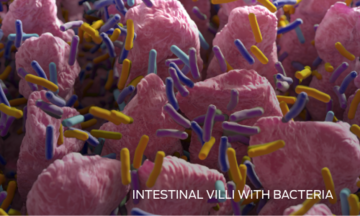Microbiome-Centric Interventions for Pet Health Conditions

Accruing evidence suggests that gut microbiota help shape normal neural development, brain biochemistry and behavior, and that gut microbiome dysbiosis plays a role in the development or progression of anxiety, cognitive impairment and dementia.1
The gut microbiome affects brain function and behavior, and the brain, in turn, influences the microbiome through bidirectional intercommunication. The term ‘gut-brain axis’ refers to the constant bidirectional communication between the gastrointestinal tract and the brain via the enteric nervous system and the vagus nerve, sympathetic nervous system, hypothalamic-pituitary-adrenal axis, immune system, and microbial metabolites. 1,2
Altering the microbiome via nutritional interventions has the potential to facilitate this cross-talk between the gut and brain, and influence behavior and mood. 2,3 The gut-brain axis plays a key role in the regulation of feeding and glucose homeostasis,2 and therefore may also play an important role in the development of obesity.
Putting microbiome science into practice for brain health

Microbiome health and cognitive health are intertwined
The science
An intact microbiome and intestinal barrier are essential for maintaining a healthy gut-brain axis, and gut dysbiosis and intestinal barrier dysfunction have been associated with neuroinflammation.1,2
The microbiome and intestinal barrier are affected by age, and these changes play a role in age-related cognitive impairment and dementia.1,2

Putting the science into practice
Gut health is important for brain health, and gut dysbiosis may increase the risk of cognitive impairment. Therefore, efforts to maintain and preserve the health of the gut microbiome are important, especially in older pets, to protect brain health and cognitive abilities.
Probiotic helps maintain calm behavior in dogs
The science
Chronic gastrointestinal inflammation can induce anxiety-like behaviors, and the probiotic Bifidobacterium longum NCC3001 (BL999) acts through the gut-brain axis to produce anxiolytic effects.3,4 Up to 70% of behavioral disorders in dogs can be attributed to some form of anxiety.5 The role of the veterinary general practitioner in identifying and treating their patients’ behavior problems – such as anxiety – is a crucial one.6 Pet owners may not recognize all signs of fear and anxiety, or may only reach out once the problem has escalated to the point of crisis.7 In a blinded, crossover study, dogs supplemented with B. longum BL999 were less reactive (as indicated by lower cortisol levels), more calm (as indicated by lower mean heart rates), and potentially in a better emotional state (as indicated by increased heart rate variability) when experiencing anxiety-provoking stimuli versus when they were supplemented with a placebo. In addition, the dogs exhibited significant reduction in some anxious behaviors when supplemented with B. longum BL999 compared to when they were supplemented with placebo.15

Putting the science into practice
The probiotic strain Bifidobacterium longum NCC3001 (BL999) can reduce anxious behaviors, potentially improve emotional state, and help maintain calm behavior in dogs.

Improving canine idiopathic epilepsy through diet
The science
The microbiome is a key driver of the response to ketogenic diets in human and rodent studies.16-18
A medium-chain triglyceride-based ketogenic diet significantly reduced seizure frequency,19 reduced ADHD-like behaviors,20 and altered lipid metabolism in dogs with refractory canine idiopathic epilepsy.21

Putting the science into practice
A medium-chain triglyceride (MCT)-based diet provides an additional tool for management of canine idiopathic epilepsy, providing an opportunity to help manage epilepsy through the microbiome and gut-brain axis. More information on MCTs is available in the Brain Conditions section of our site.
Explore other areas of the Microbiome Forum

Microbiome Fundamentals

Nestlé and Purina Leadership in the Microbiome
Find out more
- Wu, M.-L., Yang, X.-Q., Xue, L. Duan, W., & Du, J.-R. (2021). Age-related cognitive decline is associated with microbiota-gut-brain axis disorders and neuroinflammation in mice. Behavioural Brain Research, 402, 113125. doi:10.1016/j.bbr.2021.113125
- Richards, P., Thornberry, N. A., & Pinto, S. (2021). The gut-brain axis: Identification of new therapeutic approaches for Type 2 diabetes, obesity, and related disorders. Molecular Metabolism, 46, 101175. doi:10.1016/j.molmet.2021.101175
- Bercik, P., Verdu, E. F., Foster, J. A., Macri, J., Potter, M., Huang, X.,…Collins, S. M. (2010). Chronic gastrointestinal inflammation induces anxiety-like behavior and alters central nervous system biochemistry in mice. Gastroenterology, 139, 2102–2112. doi:10.1053/j.gastro.2010.06.063
- Bercik, P., Park, A. J., Sinclair, D., Khoshdel, A., Lu, J., Huang, X.,…Verdu, E. F. (2011). The anxiolytic effect of Bifidobacterium longum NCC3001 involves vagal pathways for gut-brain communication. Neurogastroenterology & Motility, 23(12), 1132–1139. doi: 10.1111/j.1365-2982.2011.01796.x
- Beata, C., Beaumont-Graff, E., Diaz, C. Marion, M., Massal, N., Marlois, N., Muller, G., & Lefranc, C. (2007). Effects of alpha-casozepine (Zylkene) versus selegiline hydrochloride (Selgian, Anipryl) on anxiety disorders in dogs. Journal of Veterinary Behavior, 2, 175–183.
- Stelow, E. (2018). Diagnosing behavior problems: A guide for practitioners. Veterinary Clinics of North America, 48(3), 339–350. doi:10.1016/ j.cvsm.2017.12.003
- Ballantyne, K. C. (2018). Separation, confinement, or noises: what is scaring that dog? Veterinary Clinics of North America: Small Animal Practice, 48(3), 367–386. doi:10.1016/j.cvsm.20112.005
- Salman, M. D., Hutchison, J., Ruch-Gallie, R., Kogan, L., New, J. C., Kass, P. H., & Scarlett, J. M. (2000). Behavioral reasons for relinquishment of shelter dogs and cats to 12 shelters. Journal of Applied Animal Welfare Science, 3(2), 93–106.
- Tanaka, A., Wagner, D. C., Kass, P. H., & Hurley, K. F.. (2012). Associations among weight loss, stress, and upper respiratory tract infection in shelter cats. Journal of the American Veterinary Medical Association, 240(5), 570–576. doi:10.2460/javma.240.5.570
- Landsberg, G., Hunthausen, W., & Ackerman, L. (2013). Behavior Problems of the Dog & Cat. Great Britain: Saunders Elsevier. pp. 181–182.
- Mills, D., Karagiannis, C., & Zulch, H. (2014). Stress – Its effects on health and behavior: A guide for practitioners. Veterinary Clinics of North America: Small Animal Practice, 44, 525–541.
- Mariti, C., Gazzano, A., Moore, J. L., Baragli, P., Chelli, L., & Sighieri, C. (2012). Perception of dogs’ stress by their owners. Journal of Veterinary Behavior, 7(4), 213–219.
- Seibert, L. M., & Landsberg, G. M. (2008). Diagnosis and management of patients presenting with behavior problems. Veterinary Clinics of North America: Small Animal Practice, 38, 937–950.
- Patronek, G. J., & Dodman, N. H. (1999). Attitudes, procedures, and delivery of behavior services by veterinarians in small animal practice. Journal of the American Veterinary Medical Association, 215(11), 1606–1611
- McGowan, R. T. S., Barnett, H. R., Czarnecki-Maulden, G., Si, X., Perez-Camargo, G. & Martin, F. Tapping into those ‘gut feelings’: Impact of BL999 (Bifidobacterium longum) on anxiety in dogs. ACVB Veterinary Behavior Symposium; July 12, 2018; Denver, Colorado.
- Zarnowska, I. M. (2020). Therapeutic use of the ketogenic diet in refractory epilepsy: What we know and what still needs to be learned. Nutrients, 12, 2616. doi:10.3390/nu12992616
- Cabrera-Mulero, A., Tinahones, A., Bandera, B., Moreno-Indias, I., Macias-González, M., & Tinahones, F. J. (2019). Keto microbiota: A powerful contributor to host disease recovery. Reviews in Endocrine and Metabolic Disorders, 20(4):415–425. doi:10.1007/s11154-019-09518-8
- Ma, D., Wang, A. C., Parikh, I, Greene, S. J., Hoffman, J. D., Chlipala, G.,…Lin, A.-L. (2018). Ketogenic diet enhances neurovascular function with altered gut microbiome in young healthy mice. Scientific Repots, 8, 6670. doi:10.1038/s41598-018-25190-5
- Law, T.H., Davies, E.S., Pan, Y., Zanghi, B., Want, E., Volk, H.A. (2015). A randomised trial of a medium-chain TAG diet as treatment for dogs with idiopathic epilepsy. British Journal of Nutrition, 114, 1438–1447. doi:10.1017/S000711451500313X Erratum in: British Journal of Nutrition, 2016; 115:1696.
- Packer, R. M. A., Law, T.H., Davies, E., Zanghi, B. M., Pan, Y., & Volk., H. A. (2016). Effects of a ketogenic diet on ADHD-like behavior in dogs with idiopathic epilepsy. Epilepsy & Behavior, 55, 62–68. doi: 10.1016/j.yebeh.2015.11.014
- Law, T. H., Volk, H. A., Pan, Y., Zanghi, B., & Want, E. J. (2018). Metabolic perturbations associated with the consumption of a ketogenic medium- chain TAG diet in dogs with epilepsy. British Journal of Nutrition, 13, 1–7. doi:10.1017/S0007114518001617
